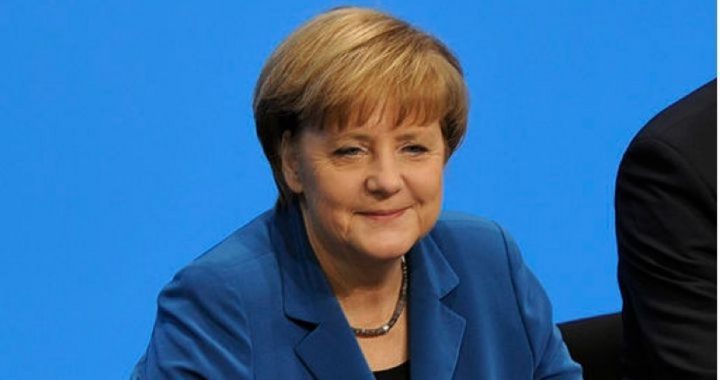
The entrance of German Chancellor Angela Merkel (shown) into the referendum campaign over whether Britain will leave the European Union (EU) is a clear indication that the “Leave” (or “Brexit” — British exit) forces are now leading the “Remain” forces. BBC political editor Laura Kuenssberg noted that just a few weeks ago, her German sources told her that Merkel did not intend to address the referendum scheduled for June 23.
Joining Merkel in advising the British to remain in the EU was Dutch leader Mark Rutte and Spanish Prime Minister Mariano Rajoy. Rutte warned the Leave forces of Britain that any effort by the United Kingdom (U.K.) to limit immigration would lead to a tit-for-tat response from other European countries. “You would get a race to the bottom and that’s exactly what you don’t want,” he advised.
Rajoy opined that a Brexit vote would be a “negative for everybody.”
Merkel’s remarks are seen as part of a coordinated effort by Europe’s political leaders to stop a British exit. But since Germany is the clear “heavyweight” of the EU, her comments are of the greatest significance.
While admitting it is a decision for the British people to make, Merkel said her hope was that the U.K. would vote to stay in EU. The U.K. is “part and parcel” of the EU, she insisted, and its membership is of “benefit to all of us.”
But Merkel was once quoted as having said, “You can get much further with a kind word and a gun than with a kind word alone.” After speaking the kind word(s), Merkel pulled out the “gun,” cautioning the British public to understand that the EU would never compromise with an outsider in the same manner as with a fellow EU member:
We work well together with the U.K. particularly when we talk about new rules for the EU. We have to develop those together with the U.K. and whenever we negotiate that, you can much better have an influence on the debate when you sit at the bargaining table and you can give input to those negotiations and the results will then invariably be better rather than being outside of the room.
She added,
It would be not only be in our interest but it could also be in the interest of Britain when it can bring its whole political weight to the negotiating table as part and parcel of the EU.
Merkel insisted that it is important for Europe to have a single market — a free trade area. She defined this free trade area as one with the free movement of goods, people, and capital.
The argument that Britain can get a “better deal” inside the EU rather than outside is a major point of contention inside the U.K. The Leave side points out that British Prime Minister David Cameron promised during his reelection campaign in 2015 that he would hold the present Brexit referendum, although he strongly opposed actually leaving the EU. Instead, he promised to get special treatment reforms for the U.K., hoping this would reduce the fervor for a British exit. It is largely believed in Britain that he got nothing, but rather gave in on all points.
This was followed by the massive migration from the Middle East, highlighting a huge concern the British public has with the EU. The member nations of the EU have effectively lost control of their own borders because of EU membership requirements. Once a person is allowed into one EU member state, that person is then free to travel to any other member state. This concern over immigration is a principal reason why many Brits now desire to leave the EU.
Boris Johnson, a Conservative Party member of parliament who favors the Brexit, believes the entry of political leaders of other EU nations into the British referendum campaign is an indication that the elites of the EU have “hit the panic button.” Johnson added that the Germans and the Dutch “must be worried that if we stop sending Brussels [the headquarters city of the EU] 350 million pounds a week, they will have to pick up our tab for the EU’s largesse. “
Johnson specifically challenged Merkel’s claim that Britain would have more negotiating influence inside the EU, calling it “completely hollow,” because when Cameron tried to get reforms, “she blocked them.”
“The ‘In’ campaign are panicking because they see that people are turning against them and simply do not believe their relentless campaign of doom and gloom,” Johnson concluded.
Many Tory leaders besides Johnson have broken with Cameron over the issue, and have also taken umbrage at what they considered Merkel’s meddling in British politics. Liam Fox, a former Conservative defense secretary, expressed disdain at Merkel’s “veiled threats.” asking, “When will they understand we will not be bullied into staying?”
Another former Tory defense minister, Sir Gerald Howarth, concurred, arguing that Merkel’s refusal to consider any serious concessions when Cameron tried to obtain them was proof that Britain has no real influence inside the EU. Despite Britain’s aid in rebuilding Germany after World War II, Howarth found it “a bit rich” that the U.K. is now being “lectured” by the Germans, adding that it was “very disappointing.” “The idea that we have influence inside the EU is for the birds,” he stated.
Another Tory MP, Jacob Rees-Mogg, dismissed the idea that Merkel would punish the U.K. with a trade war as a hollow threat, arguing that any such move by Germany and other EU countries would only rebound to hurt their own economies as well. “Does Mrs. Merkel want to punish German car manufacturers from whom we import billions of pounds of cars each year?” he asked.
While the support for remaining inside the EU is bipartisan, the Leave forces are also bipartisan. Kate Hoey, a Labour MP, told the BBC that Merkel would be “well advised to stay out of what is a very, very important vote.”
“We can do extremely well outside the European Union,” Hoey said. “We don’t need to be in the single market. Other countries trade with the European Union and are not in the single market. We are the fifth largest economy; we can look outwards.”
If the negative response to President Obama’s earlier comments to the Brits that it would be in their interest to remain in the EU is any indication, the pressure from political leaders from the Netherlands, Spain, and Germany could also very well backfire.
In April, Obama counseled the British public to stay in the EU, warning them that if they left, they would then “go to the back of the queue” for any future trade deals. This threat, that the United States would not make a bilateral trade deal with the U.K., is also empty, for two reasons. For one, if it is in the interest of the United States to trade with the U.K., then why would we not do so? And second, the Leave forces know that Obama has only a few months left as president, and any significant trade agreement between the United States and the U.K. would be negotiated with his successor.
Another factor in Obama’s intervention that probably only strengthened the Leave side is that the American president is widely unpopular in Britain. When Obama was running in 2008, many Brits had hopes that, as president, he would stay out of British politics. President George W. Bush was widely resented in Britain for dragging the Brits into the Iraq War, disgustingly referring to former Prime Minister Tony Blair as “Bush’s poodle.”
Writing in the May 9 print edition of The New American, William F. Jasper summarized the issues that are driving the push to exit the EU: EU spending, EU taxes, EU regulations, EU bailouts, EU corruption, and EU usurpations of British sovereignty.
Cameron has said that his own nation’s “sovereignty” is of less importance than “security cooperation,” raising the specter of another European war, should the EU implode.
Exactly why “security cooperation” requires the dilution of British national sovereignty in a European superstate is not explained, but it is instructive to those of us on this side of the pond. Increasingly, it appears that whether in Great Britain or in the United States, the division is not so much between Conservative Party or Labour Party there, or the Republican Party or the Democratic Party here, but between those who favor national sovereignty, and those who support globalism.
Steve Byas is a professor of history at Randall University in Moore, Oklahoma. He is the author of History’s Greatest Libels, and two murder mysteries, Digging Up Bones, and Sooner Dead.



